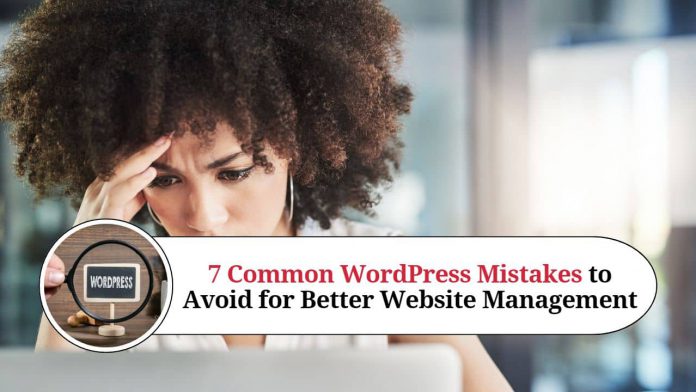Whether you’re just a new user or a seasoned one, mistakes happen, and as you grow, you learn the best practices of WordPress development. Some of these mistakes happen because of development errors, some because of forgetfulness, and others because of the wrong configuration.
In this post, we’ll walk you through the most common WordPress mistakes and how to avoid them. Make sure that you remember these issues so that you can avoid them.
Not only will this make the entire development process much quicker, but it lets you finish your site without repeatedly dealing with the same problems.
1. Not Keeping WordPress and Plug-ins Updated
Sometimes, it can be difficult to track all the updates your site needs. If everything is working well, it can be challenging to prioritize updates.
But keep in mind your plug-in, themes, and WordPress updates are crucial for several reasons, with security being on top of everything. If a site is compromised, it’s likely because it runs on an old and exploitable version of WordPress or it has an outdated theme or plug-in. Keeping your plug-ins and themes up to date is crucial for your site’s security.
2. Poor Backup and Restore Practices
Another WordPress best practice is to have daily backups on your site. Several issues can happen and may knock your site offline and even cause you to lose your files and content.
Fortunately, many hosting providers will automatically perform backups for you. You can also use some of the best WordPress backup plug-ins to help you do this.
3. Ignoring Website Security Best Practices
There’s no way to make your website completely secure. But there are several steps that you can take to boost its security and deter hackers.
This is because hacking is mostly a numbers game wherein hackers manage to crawl thousands, even millions, of sites, looking for vulnerabilities to exploit.
4. Overloading with Unnecessary Plug-ins and Themes
Plug-ins are vital for site maintenance. They provide several solutions, from security plug-ins to contact form plug-ins. While they’re highly effective in running your site, using too many plug-ins can lead to various problems, including website crashes, security breaches, and slow-loading websites.
At Sytian Productions, philippines web designer – we always tell clients that to avoid these issues, it’s recommended that you install plug-ins that are vital to your site. There’s no real set rule on the ideal number of plug-ins you install on your site. However, a great rule of thumb is installing only reputable plug-ins that provide your site and visitors the most benefits.
Here is a criterion that you can follow in verifying plugin-ins:
- Check for the last plug-in update. If it’s made over a year ago, then it’s highly likely outdated, so you don’t need to install it. Ideally, look for plug-ins that are updated weekly or at least monthly.
- Look for the total number of downloads and then read the reviews. Most of the time, you must look for reputable plug-ins with at least a thousand downloads and at least four stars.
- Check for the support tab on the plug-in description. You’ll likely need to contact support for any issues with the plug-in. If the tab doesn’t take you to the forum or the support page, you don’t have to download the plug-in.
5. Ignoring Website Performance Optimization
Search engines are like the gatekeepers of the internet. They’re the ones who will decide which sites will rank on the top. To appeal to a demographic that will make conversions, your site needs to rank high on search engines.
Although you might prefer to build a brand via PPC advertising or social media marketing, SEO can bring in the larger slice of the pie by getting tons of traffic on your site and a significantly low cost.
6. Now Installing Google Analytics
The benefits of installing Google Analytics on your site couldn’t be overstated. From getting detailed user reports to browser interactions, Google Analytics on your website is essential.
Many developers forget to add this vital piece to their site, thinking it’s unimportant. Similarly, Analytics also interacts with other Google search and indexing tools to enhance your rankings on search results.
7. Not Being Mobile Friendly
Mobile usage is at an all-time high, so your site must be responsive in various browsers and screen sizes. Fortunately, a lot of WordPress themes these days are mobile-friendly. However, it never hurts to stay on top of the issue just to be sure.
Over to You
So there you have it. Whether you’re new to WordPress or consider yourself an expert, you will encounter these roadblocks over time. Thus, it’s better to learn from the mistakes. So, make sure that you apply these tips to avoid committing these most common WordPress mistakes when building your site.












